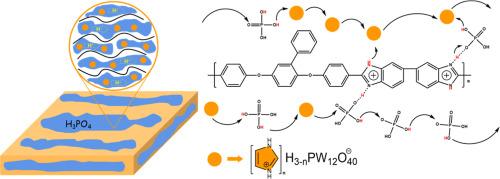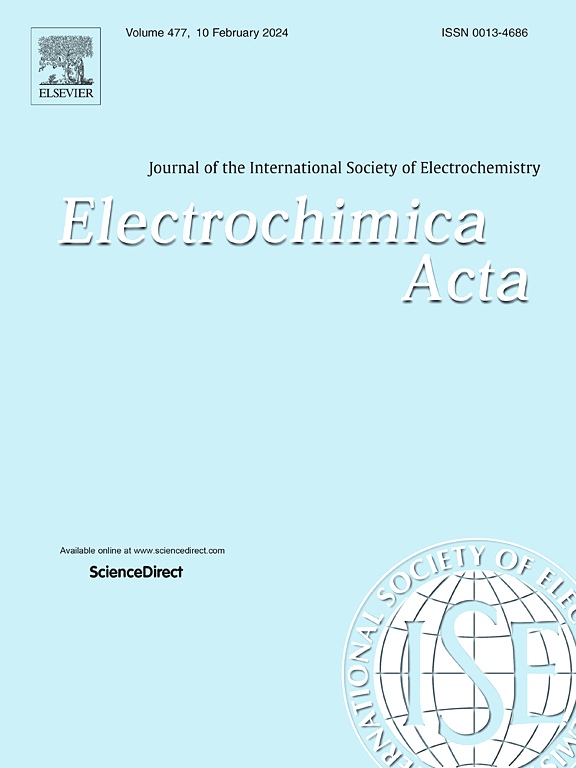Arylether-type polybenzimidazole-based composites containing imidazole-substituted heteropolyacid salts for high-temperature proton exchange membrane fuel cells
IF 5.5
3区 材料科学
Q1 ELECTROCHEMISTRY
引用次数: 0
Abstract
Phosphoric acid-doped polybenzimidazole (PA-PBI) membranes are one of the most promising candidates for practical applications in high temperature proton exchange membrane fuel cells. In the field of the proton exchange membranes, a key target is to develop the membranes possessing high proton conducting ability, and meanwhile maintaining good mechanical integrity. It is extremely hard for PBI-based membranes at a high acid doping level (ADL) to have good strength due to the strong “plasticization effect” caused by PA molecules to PBI backbones. In order to obtain high-proton-conductivity membranes with a good comprehensive performance, three imidazole-substituted heteropolyacid salts (imi-HPAs) were synthesized and then incorporated into an arylether-type polybenzimidazole (Ph-PBI) matrix to fabricate some composite membranes via a solution blending process. Since both Ph-PBI matrix and imidazole-substituted heteropolyacid salts contained the functional imidazole groups, some preferred mixed effects and performance enhancements of the organic-inorganic composite membranes were observed. The morphology of the composite membranes revealed that imidazole-substituted heteropolyacid salts were homogenously dispersed in the Ph-PBI matrix. The membrane Ph-PBI/imi-HPA-3-15% at ADL∼290.4% had the highest conductivity of 166.6 mS·cm-1 at 200 °C. A H2/O2 fuel cell based on one membrane showed a peak power density of 454 mW·cm-2 at 160 °C, without humidification.

用于高温质子交换膜燃料电池的含咪唑取代杂多酸盐的芳基型聚苯并咪唑基复合材料
掺杂磷酸的聚苯并咪唑(PA-PBI)膜是高温质子交换膜燃料电池中最有实际应用前景的候选膜之一。在质子交换膜领域,开发具有高质子传导能力、同时保持良好机械完整性的膜是一个关键目标。由于 PA 分子对 PBI 骨架具有强烈的 "塑化效应",因此高酸掺杂水平(ADL)的 PBI 基膜很难具有良好的强度。为了获得综合性能良好的高质子传导膜,研究人员合成了三种咪唑取代杂多酸盐(imi-HPAs),然后将其加入到芳基型聚苯并咪唑(Ph-PBI)基质中,通过溶液混合工艺制成了一些复合膜。由于 Ph-PBI 基体和咪唑取代杂多酸盐都含有功能性咪唑基团,因此有机无机复合膜具有一些优选的混合效应并提高了性能。复合膜的形态显示,咪唑取代的杂多酸盐均匀地分散在 Ph-PBI 基质中。ADL∼290.4%的Ph-PBI/imi-HPA-3-15%膜在200 °C时的电导率最高,达到166.6 mS-cm-1。基于一种膜的 H2/O2 燃料电池在 160 °C 时显示出 454 mW-cm-2 的峰值功率密度,无需加湿。
本文章由计算机程序翻译,如有差异,请以英文原文为准。
求助全文
约1分钟内获得全文
求助全文
来源期刊

Electrochimica Acta
工程技术-电化学
CiteScore
11.30
自引率
6.10%
发文量
1634
审稿时长
41 days
期刊介绍:
Electrochimica Acta is an international journal. It is intended for the publication of both original work and reviews in the field of electrochemistry. Electrochemistry should be interpreted to mean any of the research fields covered by the Divisions of the International Society of Electrochemistry listed below, as well as emerging scientific domains covered by ISE New Topics Committee.
 求助内容:
求助内容: 应助结果提醒方式:
应助结果提醒方式:


